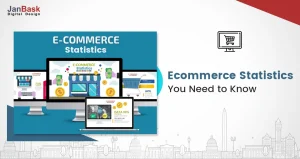
Content Index
- Introduction
- WordPress vs Joomla vs Drupal - Exploring Their Individual Stardom!
- WordPress vs Joomla vs Drupal - On Whom to Place Your Bet?
- What Happens if you Don’t Go for any CMS Option Between Joomla vs WordPress vs Drupal?
- Drupal vs WordPress vs Joomla - So Which One?
- Final Words on WordPress vs Joomla vs Drupal!
Introduction
“Building a CMS website can be daunting, more of that, it could be confusing.”--- quoted by many young businesses & bloggers out there!
Our development team was chatting with young business owners & bloggers on community forums, and there they saw a persistent question “which CMS to choose - WordPress vs Joomla vs Drupal?”
This question clears the air that the craze & popularity of Wordpress is not just enough to turn it into a handy choice. Young businesses, bloggers, and artists are actually open to exploring more adaptable CMS options like Drupal & Joomla that could bring forth more features, functionality, usability at limited costs. A CMS (content management system) helps you create, manage, and modify the contents of your website without the need for any HTML or CSS coding skills.
The easy-to-use nature of the modern CMS platforms means that anyone can build themselves a great-looking website all on their own.
This post lockdown scenario has created a burning desire for new or old businesses to explore the best CMS platforms to create their beautiful, personalized, and optimized website from scratch by all themself or via the help of a custom website design company (for more customization & uniqueness, you know).
So let’s contribute to your desire by helping you evaluate the best choice in the heated competition between Drupal vs WordPress vs Joomla. And let’s help you find the difference between Joomla and WordPress or Drupal. But before we quench your query on WordPress Joomla Drupal comparison, let’s put down the reasons why individual builders are known & have their own stardom.
WordPress vs Joomla vs Drupal - Exploring Their Individual Stardom!
Why WordPress as CMS?
- WordPress is the most popular CMS platform across the globe, catering to around 27% of the websites across with a 64 % market share. This CMS is loved because of its user-friendly approach, unique plugins, flexibility, and non-technical governance.
- Diverse industries like eCommerce, Finance, Healthcare, & more industry professionals use WordPress for meeting their basic to classic web needs. Even popular magazines like New York Post, BBC America, Brian Smith use this CMS for their websites or blogs, etc.
- WordPress has a global community with many millions of enthusiasts, developers, users, designers, and even volunteers. Many regional or national communities also organize various events like WordCamps to discuss the latest issues and developments in the area.

Why Joomla as a CMS?
- Joomla is the 2nd most popular content management system after WordPress. Released in 2005, it is the youngest CMS but has earned a huge public interest as it serves as an excellent platform for building websites, blogs, or portfolios.
- Many millions of websites (3.5% of CMS websites) use it as CMS for a business, educational, entertainment, technology, or more such verticals. It also has a big open source community across the world that works to provide support to its members via forums or organizing events and helps others to make it better than before, in terms of ease of use & customizability.
Why Drupal As a CMS?
- Drupal may be the oldest gold mine in the CMS platform but it still ranks 3rd with a 4% market share. The focus of Drupal is to provide robust security, reliable performance, and customizability.
- Millions of websites run on Drupal which also include governmental websites, eCommerce, education websites, etc. It is endowed with a huge open source community with over a million dedicated web developers, trainers, strategists, editors, etc. Also, its working groups keep holding meetings in different parts of the world. DrupalCon events are also organized which allow users to take up skill training to brush up their skills.
Now let’s put up the fight between Drupal vs WordPress vs Joomla.
What’s Common in WordPress, Joomla and Drupal?
All three of the web’s most popular CMS have a lot in common in terms of technology, philosophy, and community.
- WordPress, Joomla, and Drupal are all free and open source software licensed under GPL. See our article on why WordPress is free to learn more about free software.
- All three of them are written primarily in PHP.
- They all support MySQL as their database management system. WordPress exclusively supports only MySQL, while Joomla and Drupal support other database management systems.
- All three of them use themes and templates for visual appearance of sites, and plugins, modules, or extensions for extending features.
- As open source software, they are all community-driven projects.
While there are a lot of similarities, they are different in many aspects.
For instance, they have different policies about what to include in the core software, how to handle modules and templates, how to deal with security, etc.
These differences make a big impact on users, and how they build their websites.
Having that said, let’s take a look at how WordPress, Joomla and Drupal compare to each other, so you can choose the best website builder platform for your business.
WordPress vs Joomla vs Drupal - On Whom to Place Your Bet?
These three CMSs Joomla vs WordPress vs Drupal aren’t interchangeable even though they are open-source and based on PHP language & MySQL Database. These 3 platforms have a lot of individual qualities, limitations that can vary or relate to different businesses’ website needs in different proportions. Want to know what are those qualities & limitations? Continue reading, as this blog will enlighten you with the best CMS choice and put the fight between Joomla vs WordPress vs Drupal to forever sleep.
1. WordPress vs Drupal vs Joomla - How Much Do Each Platform Costs?
All three platforms Initially are free or cost-effective as they have their basic free-source layout to start your simple blog or complex websites. However, it doesn’t mean you won’t have to shell out any money on these platforms. There are 4 types of costs, you will have to meet when planning to run your digital identity through them, which are as follow:
Factors |
WordPress |
Drupal |
Joomla |
|
Hosting & Domain (varies based on hosting platform & can be paid annually or yearly) |
|
|
|
|
Plugins, Extensions, Modules |
Ranges between $47 to $200 (paid one time or on a recurring basis) |
Drupal modules can start from $50 and up/year. |
Has complete plans between $99 to $399 per year, which includes extensions. |
|
Premium Design Themes |
Between $10 to $200 |
Between $30-$50 |
Has a plan starting at $199 per year, including the themes. |
|
Developer’s fee (if going for customization) |
Pricing depends on the choice, whether it’s a freelance WordPress developer or a WordPress development agency (including on-site, offshore, or Hybrid companies). |
Pricing depends on the choice, whether it’s a freelance Drupal developer or a Drupal development agency (including on-site, offshore, or Hybrid companies). |
Pricing depends on the choice, whether it’s a freelance Joomla developer or a Joomla development agency (including on-site, offshore, or Hybrid companies). |
However, if you wish to enjoy more scalability, flexibility, and security on each of these platforms, you can migrate your Linux shared hosting to cloud hosting with vendors like AWS, Google Cloud or so. You can check out their hosting plans on their official web.
2. WordPress vs Drupal vs Joomla - Biggest Beneficiaries of Each Platform?
You might be wondering, are these platforms even getting leveraged by anyone else? Well, the market share of each platform tells us how competing & top-level these CMSs are, but let’s tell you the name of the popular platforms that are built on top of these platforms.
Notable Names that are using WordPress for Real Good
Over 75 million websites are built on WordPress. Here are the few names that got stunning websites from their wildest dreams.
- BBC America
- The White House (shifted from Drupal to WordPress)
- Katty Perry
- Sony Music
- TechCrunch
- The official Star Wars Blog
- 10Web
- MTV News
- New York Times
- The Walt Disney Company
- The Rolling Stones
Notable Names that are Using Drupal for Real Good
In the first 1,000,000 sites on the web, you will find over 31,000 sites made on Drupal. Let’s see what few popular names got amazing designs as desired & expected with Drupal.
- Tesla
- NASA
- Entertainment Weekly
- Mint
- NCAA
- Le Figaro
- Australian Government
- Keap
- The Emmy Awards
- ABS- CBN News
Notable Names that are Using Joomla for Real Good
Around 2.5 million worldwide websites are built on Joomla. Here are the few popular names that are using Joomla to experience drastic shifts in web design patterns.
- IKEA
- Harvard University
- Lipton Ice Tea
- The Fashion Spot
- The Hill
- Holiday Inn
- UNRIC
- Guggenheim
- IT Wire
3. WordPress vs Joomla vs Drupal - Which one Offers Complete Customization?
WordPress Joomla Drupal comparison based on customization would be a little tough, as all three platforms give you the scope to customize the themes & templates as per your likeability & interest. However, the task of upping up your theming game can be daunting as it would require professional coders’ help. It’s better you deploy the help of a custom web design company that has expertise in any of these three web building platforms.
4. WordPress vs Drupal vs Joomla - Which Gives Great Data Ownership?
Does Joomla Give Data Ownership?
Joomla as an open-source CMS gives the extreme freedom to keep the full ownership of creating, displaying, managing and using the data. Joomla gives 4 types of extensions like components, plugins, modules, templates. It’s up to you if you want to use these extensions on the blog, web’s front-end, or back-end.
Joomla modules let the data be displayed in the front end that further helps with unified data collection & control. You can easily add any specific content or functionality to your website by using its plugins. You can ask your developer to add custom data acquisition features to the web, like forums, guest books, image galleries or so.
Joomla to meet the best data preferences of the users globally even conducts this timely audit for your web’s GDPR compliance (yes, even if you are business in the US).
Does WordPress give Data Ownership?
Any self-hosted website you create over the WordPress CMS, its data can be 100% controlled and managed by you. To protect the best data interests of the users, WordPress software is GDPR compliant and keeps on adding the latest enhancements, suitable to such compliance.
Does Drupal Give Data Ownership?
Yes, drupal gives data ownership of drupal's files, core directories, subdirectories to the person who administers Drupal.
5. WordPress vs Drupal vs Joomla - Which is Easy to Use?
The 3 CMSs WordPress, Drupal, and Joomla are easy to use for content authors, publishers & website builders. And can easily help you prepare powerful business websites, blogs, and portfolios. Each platform’s navigable, point & click interface won’t be overwhelming as long as you have basic computer skills.
However, if you are looking for more tweaking, editing, and customization, you will be needing technical support to do that, in the form of short-term developers or a complete off-shore development company.
6. WordPress vs Drupal vs Joomla - Which One Has Best Design Themes?
WordPress Design Themes
WordPress themes are quite versatile to use as they are very handy to apply, pull a few customizations, and get the perfect digital identity your business craves.
There are two types of WordPress themes --- free & premium. Its official theme directory has over 4500+ free themes to offer, which are good to apply if you are looking for straightforward or basic designs with no experimenting.
However, if you want to go extra over the basics & get more upbeat themes that are cross-browser compatible, holds quite a lot of functionalities, are responsive, does support a great level of typography, widgets, customizations as per your need, then it is recommended to go for the paid or premium themes. The Themeforest has over 9500 premium themes to make your design possibilities & functionality just endless by adding any of the 50,000+ plugins.
Drupal Design Themes
Drupal has over 2500 free themes for a basic & straightforward look in its official theme directory. Whereas if you are looking for more customizable, professional & expandable themes, you have options to try their 450+ Premium Drupal Themes which are available at ThemeForest.

To add more flavor as functions, customizations & features to these premium designs, Drupal offers you its 37000+ modules at its official module directory. Which down the line helps you have great flexibility in extending your design & user experience.
Joomla Design Themes
Joomla has very few options in terms of design themes compared to Drupal & WordPress. Also, there is no official theme directory of Joomla. You will have to get their free themes from third-party sites, which can be an add-on to your time. And there are very few free themes as well.
Talking about premium themes, you will find them over 950+ at the ThemeForest. However, Joomla does give you an official directory for its 7500+ extensions (including both paid & free ones). You can integrate them to expand the functionality, feature & usability of any Joomla design you pick & apply.
7. WordPress vs Drupal vs Joomla - How About their Plugins?
WordPress Plugins
WordPress plugins are the best way to enhance & expand the functionality & usability of your web. Currently, there are more than 57,923 WP plugins on the official WordPress directory. WordPress plugins are user-friendly that can be easily integrated into your web and as well 100% customized based on your unique needs.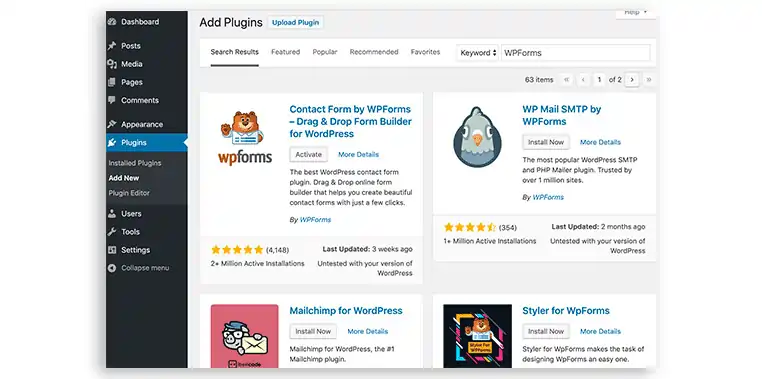
WordPress plugins include both paid & unpaid options. Like if you choose their paid plugins, you get additional features, support on priority, support documentation, and regular updates. The premium version of WP plugins starts from $49 per year.
Joomla Extension
Joomla has over 8000 extensions over its official Joomla! Extensions Directory. When you visit https://extensions.joomla.org/, there in the “Browse Extensions” menu you will find a variety of extensions bifurcated as:
- Top Rated
- Most Reviewed
- New
- Recently Updated
- Compatible with J4 Beta
Joomla may seem to have lesser extension compared to WordPress plugins, but still, they are enough to meet basic website functionality of adding galley & slideshow, SEO, putting contact forms & so much more.
Drupal Modules
You have options to add around 46,817 free Drupal Modules to bring more functionality & features to your large, complex or content-heavy sites.
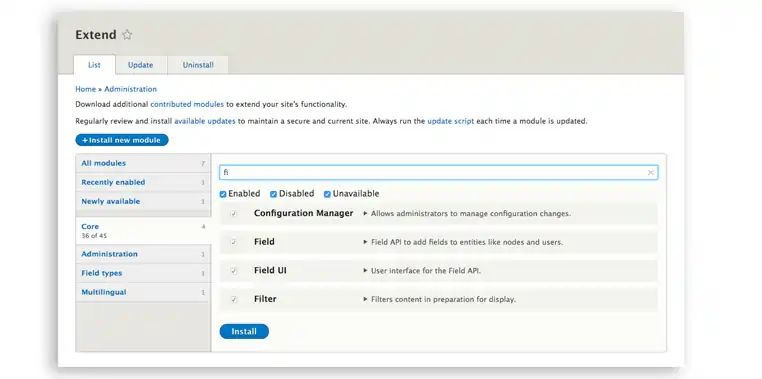 8. WordPress vs Joomla vs Drupal - Which one gives Better Customer/Community Support?
8. WordPress vs Joomla vs Drupal - Which one gives Better Customer/Community Support?
All these 3 CMSs have quite resourceful documentation & customer support to help users resolve their queries related to CMS configuration, Plugin, module or extension installation, managing accounts, granting user access, login & so much more.
- On WordPress.com, you will find documentation, community forums, live chat options that are entertained by real-world WordPress developers or employees (who call themselves happiness engineers) at WordPress.com.
- On Drupal, you will find extensive tutorials, user guides, support forums, documentation to escalate any query pertaining to the use of Drupal CMS.
- On Joomla, you get active community forums, community portals & training, and authorized documentation to clear your doubts related to Joomla operability.
Note - WordPress doesn’t charge for its query-handling services (as either it is free or involved in its pricing plans), so if anyone approaches you with paid WordPress support services, know that it may be a scam!
9. WordPress vs Joomla vs Drupal - Which is More Secure?
WordPress Security & Update
“49% of the WordPress websites were infected in 2019 which were hosted on “outdated” version - confirms 2019 Website Threat Research Report. Well, that figure is likely to be high, as 94.2% of the internet websites are hosted on WordPress.
Does that mean WordPress Websites are risky?
No, WordPress websites are secure as long as the authors & builders are doing the safe WordPress configuration & version update, security plugin installation, site monitoring & perpetual data backup.
Joomla Security & Update
Joomla websites are secure as long as you are taking correct preventive measures of activating firewalls, using two-factor authentication, data backup, encryption, and updating the latest Joomla versions & extensions. Using outdated versions of extensions may pose a threat as the hackers might upload files to your web, so better upgrade them with time.
Joomla is quite popular within academic & government websites because of its robust security layers.
Drupal Security & Update
Drupal is also safe & secure as this CMS is constantly tested by experts, has passwords encrypted, information is transmitted, modules are carefully looked at.
Irrespective of the CMS you choose, the website security goes beyond each CMS's functionality & application. The long-term security of any CMS depends on its ongoing maintenance & the hosting environment. If you are able to do it perfectly along with other security measures, then no matter what platform you choose, you will be much safer.
10. WordPress vs Joomla vs Drupal - Which one Does SEO Better?
Is WordPress good for SEO?
WordPress is great for leveraging basic SEO practices. It lets you:
- Create powerful permalinks
- Easily manage metadata
- Have amazing user interface & experience with classic themes & plugins
- Create tags & categories
- Optimize the images
- Speed up the site
- Get already mobile responsive UI
- Create customized social media buttons
- Have extensive SEO plugins as Yoast SEO, Google XML sitemaps, Google Analytics dashboard plugins & more for streamlined optimization.
Is Joomla good for SEO?
Joomla has plenty of SEO extensions that help create sitemaps or tracking the SEO metrics, other than that the CMS has help for alt tags, URL, title, metadata, page redirects, and more such features.
Joomla offers a lot of SEO extensions on its Joomla Extensions Directory!
Is Drupal good for SEO?
Drupal comes with powerful, already installed SEO automation tools, which helps in making your SEO-friendly web. The CMS lets you create friendly URLs, organize & tag keywords, automate page titles, meta tags generation, add custom fields on custom types for more unique content, or update published content with fresh & improved content & keywords which helps in the website’s ranking.
Drupal has a lot of SEO tool modules that easily integrate to your site for search engine reporting, analysis, and optimization.
Final Takeaway!
Understand this, these CMSs with SEO capabilities aren't a substitute for a definite SEO strategy, as what each offers is pure on-page basic. Regardless of the platform, you will still have to lift the finger & do the strategic SEO to rank the website. Despite these embedded features, you would still need to:
- Produce great quality, fresh content
- Earn qualified inbound links
- Optimize website in terms of layout, functionality, keywords, UX, and technical SEO aspects (like web load times, mobile responsiveness, crawling & indexing & more)
- And follow other great tips and tricks along with the professional SEO company.
11. WordPress vs Joomla vs Drupal - Which One is Multilingual?
Is Drupal Multilingual?
If you are a global business, the good news, Drupal 8 can support translations in around 100 languages with its language translation module.
Is Joomla Multilingual?
You can translate your Joomla into 103 languages with the help of the GTranslate multi-language extension.
Is WordPress multilingual?
Yes, WordPress is multilingual, with the help of its Multilingual Press plugins, the CMS can automatically translate the web into a maximum of 174 languages, either based on users’ regions, or their selection for the language preference.
Now you know all the factors to choose between Drupal vs WordPress vs Joomla. Let’s know what happens if you don’t pick any CMS between Joomla vs WordPress vs Drupal.
What Happens if you Don’t Go for any CMS Option Between Joomla vs WordPress vs Drupal?
CMS websites are a new wave of the trend, partially replacing the need for static, coded websites. If you don’t own a beautiful, usable, and revenue-centric CMS website in times like today, you would lose:
- Ability to update the new content at faster turnaround times
- Building rapport with the new-age reader & possibility to convert them into potential customers
- Creating a digital identity that’s unique & cutting-edge
Drupal vs WordPress vs Joomla - So Which One?
Okay, it’s a tough call to decide between WordPress Joomla or Drupal which is better, as each of them are justified & functional in their way. All three CMS camps are perfect for:
- Blogging
- Running stores
- Making digital portfolios
- Running membership sites
- Or any business web
The choice between Joomla vs WordPress vs Drupal is difficult as all three CMSs are good and have overlapping features.
- In case you are considering a CMS for a blog or brochure then WordPress is the best choice as it is very easy for non-developers and its flexibility also allows the creation of highly complex sites.
- However, if your prime consideration is scalability and highly intricate content organization, then you should pick Drupal. Joomla can serve as the preferred option for everything in between the two extremes.
- In the case of themes, WordPress overtakes the other two with over 11K+ themes, while Drupal offers 2K+ and Joomla offers 1K+ themes for its users.
- Even in the case of plugins, WordPress has over 47K plugins that are free while Drupal has 34K+ free plugins and Joomla 7K+ free plugins. In terms of user-friendliness, WordPress again takes a clear lead over the other two.
- WordPress is generally preferred for simple blogging, both corporate and smaller websites. Joomla, on the other hand, is useful for E-Commerce and Social Networking Sites.
- Drupal, on the other hand, is used for more advanced and technically sound websites. It was the choice of people with a technical background and the ones who can handle the complexities of technology. Thus, if you want to pick up Drupal you need to have basic knowledge about HTML, PHP, and other common programming languages or simply have to hire the developer.
Final Words on WordPress vs Joomla vs Drupal!
Each platform Drupal vs WordPress vs Joomla gives you basic free or premium themes & plugins to start, and you wish to go for more customization & flexibility, you will anyhow have to hire professionals, as you might not have that technical knowledge curve.
You can custom develop the plugins, extensions, modules & modify them as per your interests with professional freelance developers or full-suite development agencies. We just helped you highlight the quality & usability of each platform, rest is up to you, to choose the platforms that meet your budget and exemplary design expectations.
Whether you are a small-scale business, store owner, passionate blogger, you can make your dream to create your digital identity possible with any of these platforms.
Choose the one between Drupal vs WordPress vs Joomla that seems less overwhelming, has dramatic design elements & superb functionality to impress your user base. And don’t go for straightforward designs when you can tweak, edit & modify them with help of CMS Development Company near you.
Also, if you already own Drupal or Joomla Websites, you can at any point migrate over powerful WordPress CMS with us!
Also, before going away, don’t forget to flatter us in the comments below with which CMS camp are you shipping for? Is it team WordPress, Drupal, Joomla, or maybe any other (who knows!)? Also, let us know what other difference between WordPress and Joomla or Drupal & WordPress you feel are there. Create a thread of comments & we would love to join you.



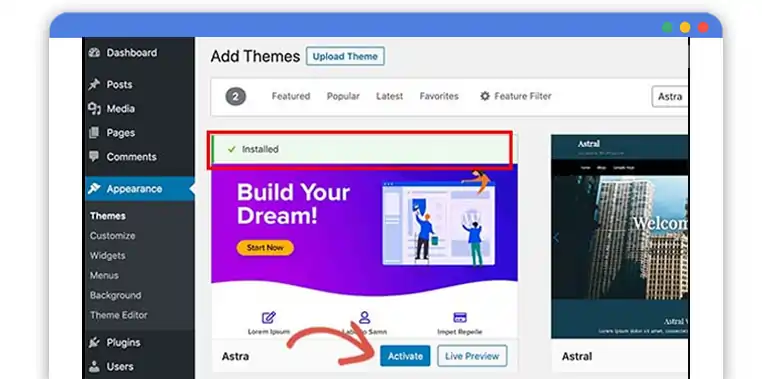

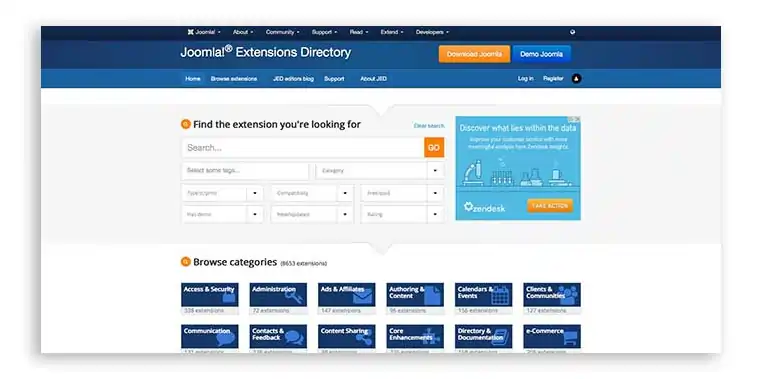

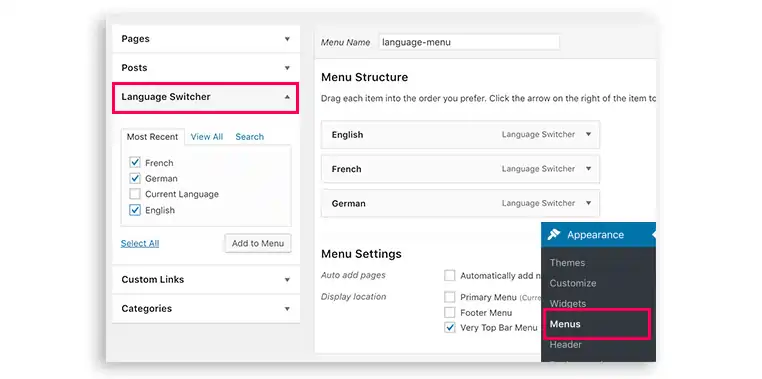
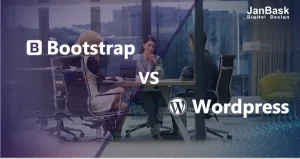

B
I am forever in team WordPress. It’s way powerful, scalable, and popular than any other CMS platforms. It is very great for blogging & regular business sites too. I just love it.
L
I feel you can easily run both the three platforms, provided, after a point, they all need technical help for custom design — in case you are rooting for the custom design. Each has their unique themes, templates, plugins, can’t really put them on the scale.
C
To be honest, I love Drupal. Since I am from a technical background, I can move & tweak codes. But yes, this platform can be a little overwhelming for a non-technical person for sure.
K
I have been using Joomla for quite a long time. It makes me sad to see how this precious CMS is losing its charm. If this CMS works a little on upgrading its themes & extensions, I feel this platform can be a kickass competition too, just saying!
J
It is ultimately the WordPress who wins in such a WordPress vs Drupal vs Joomla battle. From every aspect, this CMS is a star. The designs, plugins, user experience everything is at par with this platform.
B
Each of these platforms in my opinion are not worth comparing. Because every platform has their flaws & pros. I don’t think the limited designs of Joomla or Drupal could fight with WordPress’s thousands of themes.